MEMBER SPOTLIGHT – CLASSIC FINE FOODS
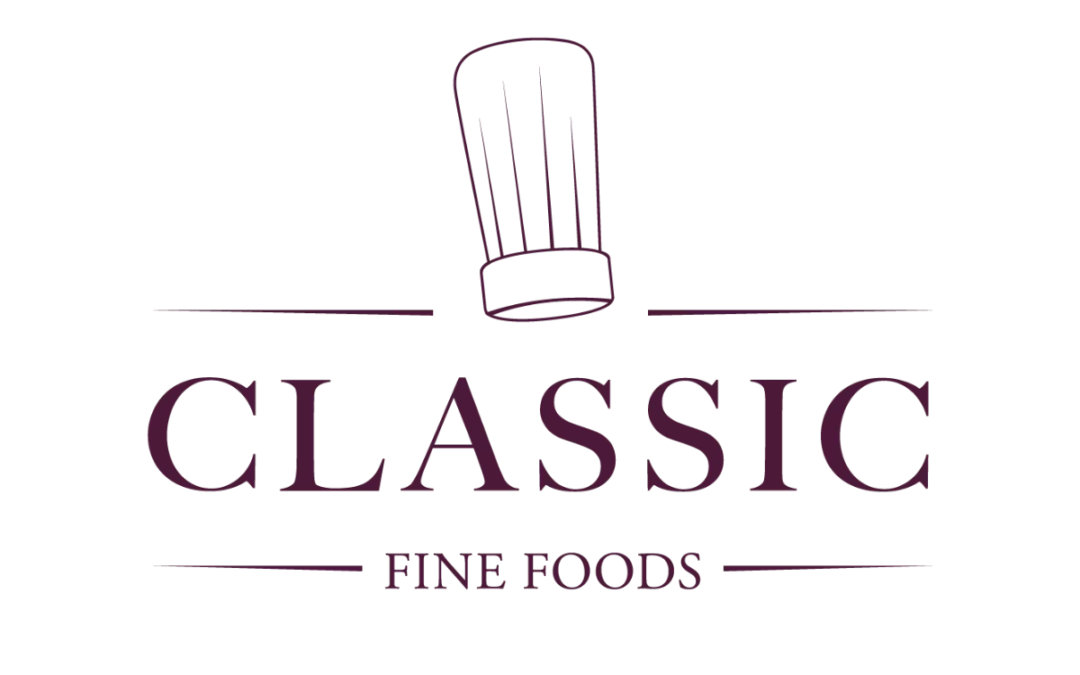
By Jade Chen
Whether it be Iberico pork, brioche loaves, Roquefort cheese or meringues, Classic Fine Foods, as its name aptly suggests, is fine foods galore. As Patrick Lesieur, Managing Director of Classic Fine Foods Hong Kong tells me, the company’s core purpose is “to bring you all you can dream of; the best in the food business from all the destinations they are produced in”. From fruits and vegetables to meat and dairy products, the company boasts an impressively vast selection of food. The products, sourced from across the globe, are supplied to an extensive clientele that ranges from members of the HoReCa sector (hotels, restaurants and cafes) to those in the retail sector (including familiar supermarket chains such as ParknShop, Wellcome and City’super).
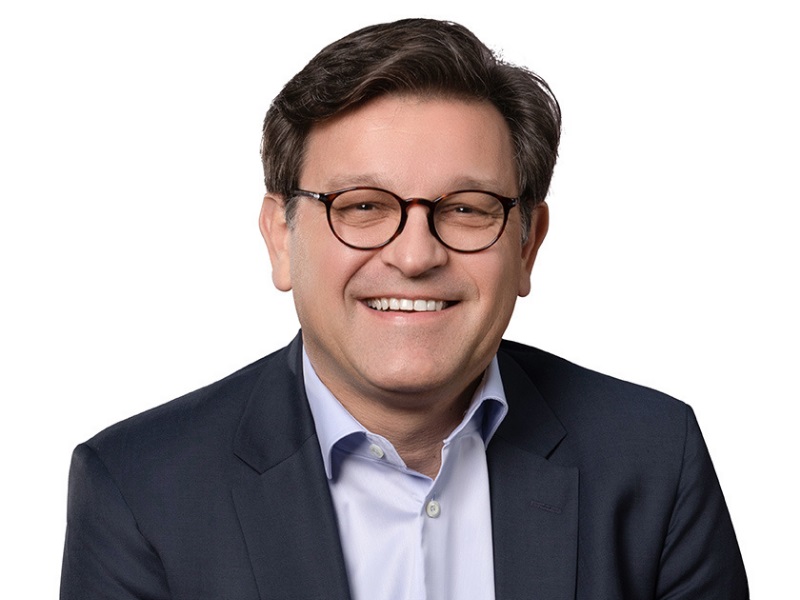 Patrick Lesieur, Managing Director of Classic Fine Foods Hong Kong
Patrick Lesieur, Managing Director of Classic Fine Foods Hong Kong
Scouting food from around the world and bringing it to Hong Kong isn’t an easy, or necessarily a planet friendly feat. Which is why the company has placed sustainability on the top of its agenda. Whether it be in Hong Kong or the 11 other countries it operates in, sustainability has begun to guide the company’s operations. “the best of the world” that the company aims to bring to consumers is, unfortunately, quite far away— this is the key paradigm the company is looking to counter.
THE SUSTAINABILITY WHEEL
Taking into account the range of factors that impact its operations, Classic Fine Foods’ sustainability framework (or, as Patrick likes to call it, sustainability ‘wheel’) is the company’s holistic approach to sustainability. Their agenda — whether that be from a budget, logistics or discussion standpoint — anchors itself to and revolves around this wheel.
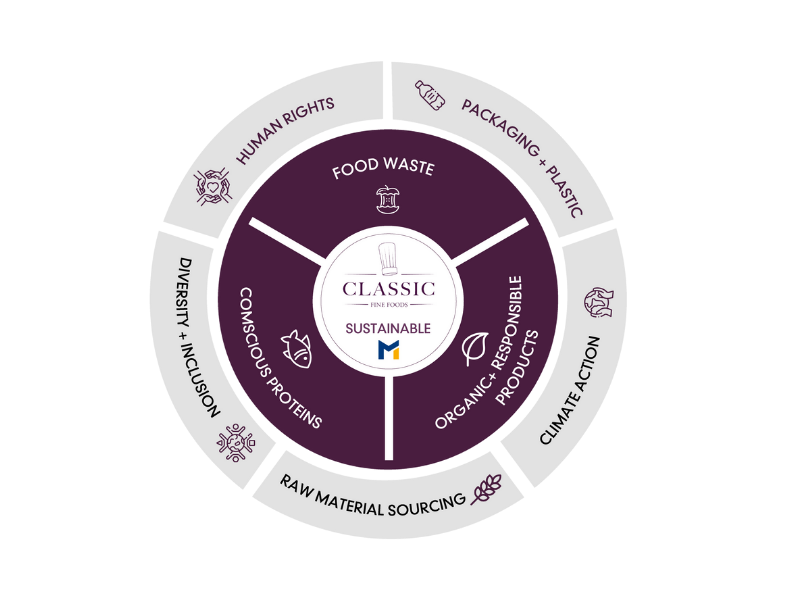
Classic Fine Foods’ Sustainability Framework
To demonstrate how the wheel guides the company’s decisions, Patrick zooms into an area that’s close to heart: plastic and packaging. When he first arrived in Hong Kong, Patrick distinctly remembered feeling shame as he saw bubble wrap on the seas and plastic currents crossing the harbour. Since then, the issue has made it to the top of Patrick’s to-do list. With the biggest warehouse of all branches, Classic Fine Foods Hong Kong uses a hefty amount of plastic packaging, and Patrick estimates that the company uses 50 different kinds of it on a day-to-day basis. Plastic packaging, whether it be from the warehouse, retail shops or deliveries to customers, has significant impacts on the environment, and Patrick has been working to identify a more sustainable alternative.
Whilst he acknowledges that addressing the issue will probably not be an investment, he accepts the challenge anyways, explaining that it is a vital step to sustain the company’s values and mission. Moreover, the company has begun working with Purawise, a company specialising in the manufacturing and distribution of reusable, sustainable and customisable packaging. With Purawise, Patrick is looking to replace some 40 different packaging items with more sustainable alternatives, which is not an easy task considering the breadth and variety of the packaging. Some items, for example, are used in great numbers; 12,000 per month, whilst other items are rarely used, perhaps just twice a month.
A TOUGH NUT TO CRACK
Arguably the most complex segment of the wheel is climate action, where Patrick faces a dilemma between sourcing quality products and emitting carbon when he brings them from countries like Australia and France all the way to Hong Kong. To contradict this predicament, the company works closely with its suppliers, ensuring that the producer of food “does things properly”. Prospective suppliers, Patrick explains, must be engaged in a sustainability agenda of their own, and demonstrate values that align with those of Classic Fine Foods.
Another important area of the company’s sustainability strategy is food waste, a complicated element considering that most of the company’s products have a limited shelf life. To avoid waste, Classic Fine Foods partners with several charities and local organisations. It also encourages the team to sell unsold products at-cost rather than destroy them — as Patrick notes, conserving the company’s values is more important than surface-level image.
INTERNATIONAL SOURCING
To tackle the problem from its root, the company has also directed its attention to more sustainable sourcing and supply. Combining standards of quality with the company’s philosophy of sourcing from producers who share the same values, Classic Fine Foods works in close partnership with suppliers to make sure products are of utmost quality. Certifications such as MSC, ASC, AOC and Label Rouge are important indicators of both quality and sustainability, and the company employs them as a means to better understand the origin of its products. Rather than going directly to the biggest producer, Patrick explains, Classic Fine Foods identifies unique farmers, fishermen and planters, taking the time to assess their practices and cross-check their values with Classic Fine Foods’ principles.
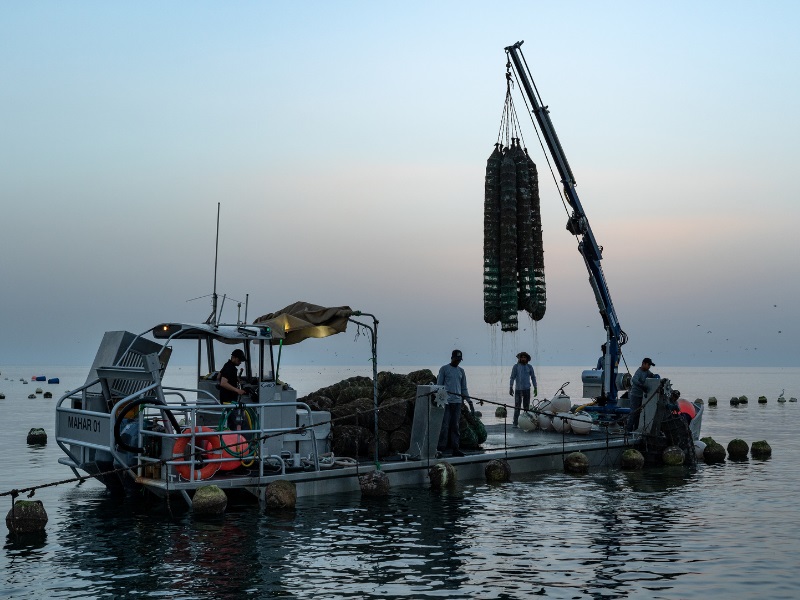
FUNELLING THE SEARCH
In addition to optimising international sourcing, the company is also shifting its focus towards the local region. Whether it be vertical farming or hydroponics, Patrick is excited to explore what Hong Kong has to offer. He mentions that there have been a few promising developments so far, with more and more planters in the New Territories growing salads, tomatoes and other vegetables.
Yet managing sourcing is all about balance. Some chefs, Patrick explains, demand produce coming from specific locations, such as France. Others are more willing to give locally-grown foods a chance, trying them out in sauces, for example, where seasoning is a relatively more important component.
Products in the fruit and vegetable category are a particular area of concern, as relatively short shelf life means these products are often transported by air. A strong believer in hydroponics, Patrick is following local progress on this front, yet acknowledges that local sourcing, at least at the moment, has its limitations. So far, he explains, Classic Fine Foods has begun to source herbs and seeds, but will be expanding their local sources to include bigger produce soon as well.

Another important but complicated component is fish and seafood. Taking oysters as an example, Classic Fine Foods distributes over half a million of these much-loved delicacies each year. One of the suppliers they’re working with is Dibba Bay Oysters, from whom the Classic Fine Foods imports 2,200 oysters a month. With Dibba Bay Oysters, the company has been testing out new technology: blockchain. “We want to see where oyster is being harvested, on which day, and at which temperature” says Patrick. “We want to see how this small oyster became an edible oyster, then was harvested, put in a box and put on a plane”. While the oyster may have come from the other side of the world, traceability must nevertheless be guaranteed. Tracking the products closely, Patrick explains, is essential, and the journey from origin to consumer is diligently observed. The reason behind incorporating blockchain into the oyster’s long journey is to build trust between the supplier and the consumer. As we continue to eat foods from around the world, blockchain will be able to deter food fraud, identify food waste hotspots along the supply chain and provide time-sensitive information that is critical for mass recalls or food contamination.
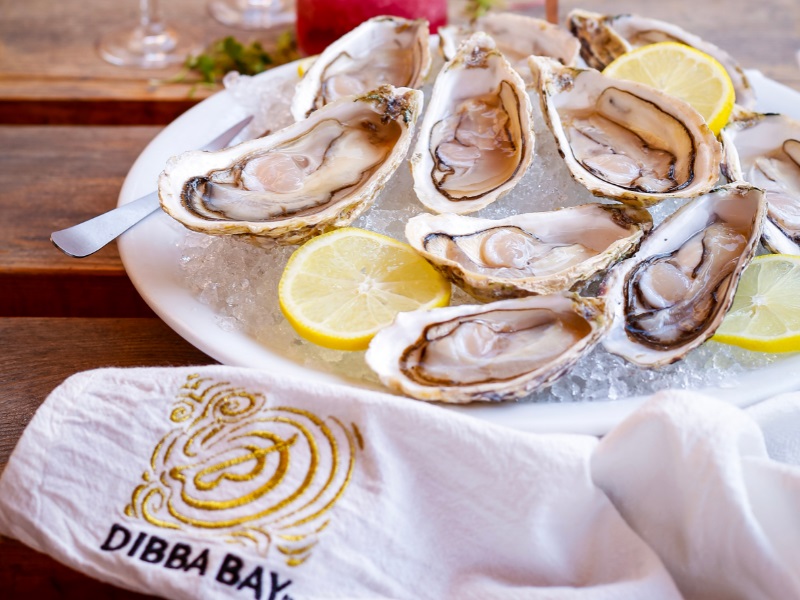
UP NEXT
Forging ahead, Classic Fine Foods’ journey for 2022 is all about finding the right balance, limiting global flying and leaning more towards local sourcing. Though each category of product will require a unique approach, Patrick is optimistic towards local initiatives and the increasing momentum of the sustainability movement in Hong Kong.
One of the initiatives in the pipeline is exploring plant-based foods, and Classic Fine Foods has already identified several prospective partners. Recently, the company introduced TiNDLE and Karana, two fellow Future Green Members, as the newest additions to its line of plant-based products. Patrick has also been testing out some of the new offerings on the market, including a plant-based foie gras which he remarks “isn’t bad”.
Yet Patrick emphasises that plant-based protein isn’t a replacement for protein. Rather, it’s an alternative option that addresses the issue of sustainability, giving chefs and diners more choice when it comes to what they eat. Patrick is confident in the movement, explaining that even small shifts in diet and attitude can create colossal change.
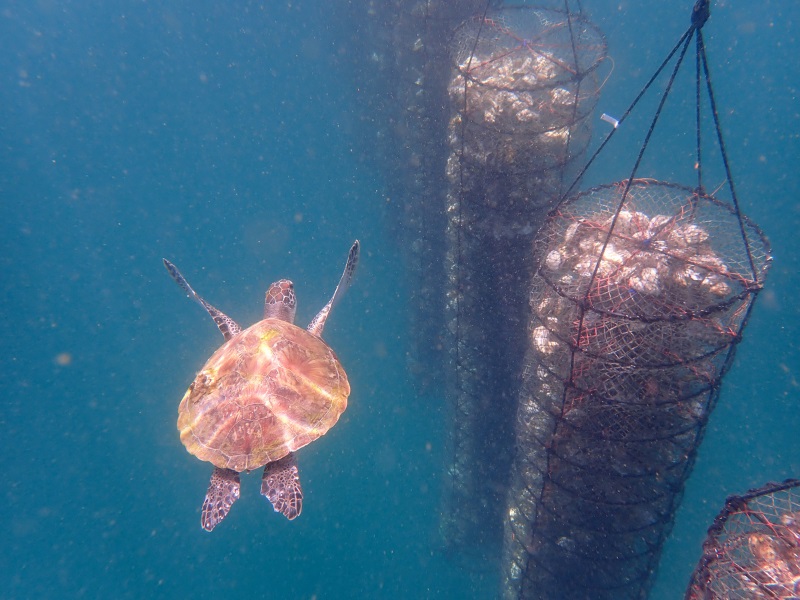
PROGRESS WELL UNDERWAY
Progress so far has been encouraging, and Patrick has already noticed a shift in demand. Some chefs, he remarks, are actively requesting more sustainable food, pushing Classic Fine Foods to search for newer, more sustainable alternatives. Chefs who are knowledgeable and passionate about sustainability seem to be driving the trend, doing their part to ingrain principles of sustainability into the food industry. AAnd whilst some may see sustainability as just a passing phase, Patrick has no doubt that the trend is here to stay. He explains that the next transition point will be making sustainability known to the public, pushing the community to evolve in the right direction. This, he shares, is why the company joined Future Green: to make sustainability a more recognised and celebrated topic. As Patrick asserts, sustainability should be turned into public knowledge, and we must all join forces if we are to create a lasting difference.
To learn more about Classic Fine Foods head to their website here.
If you make sustainable products suitable for foodservice please get in touch with us about Future Green Membership and lets see what possibilities lie ahead in normalising sustainability!
Interested in more?
2024
We’re Hiring – Marketing Interns Needed!
2024
Reflections from the Future Green Unconference 2.0: A Journey Towards Sustainable Food Systems
2024
SOURCING SEAFOOD RESPONSIBLY IS THE TOPIC OF OUR APRIL 2024 MEMBERS MONTHLY MEETUP
2024
REDUCE, REUSE, AND RECYCLE IS THE TOPIC OF OUR MARCH 2024 MEMBERS MONTHLY MEETUP
2024
PLANT-FORWARD, LESS, AND BETTER MEAT IS THE TOPIC OF OUR FEBRUARY 2024 MEMBERS MONTHLY MEETUP
2024
Marketing Coordinator
2024
The Recycling Crisis: Why Hong Kong Must Prioritise Reducing over Recycling
2024